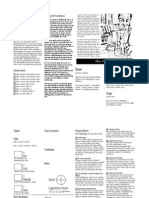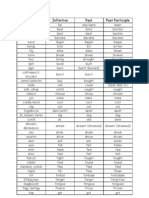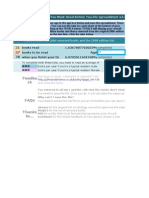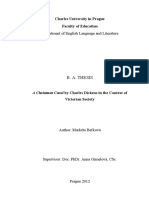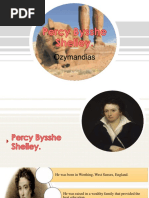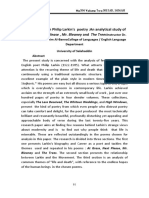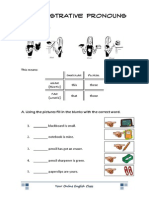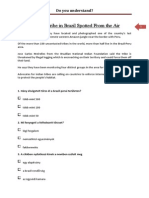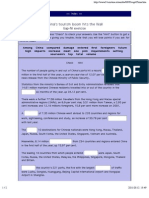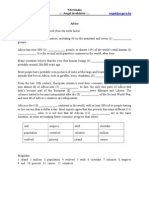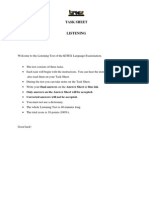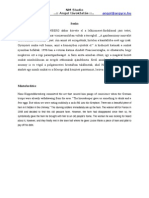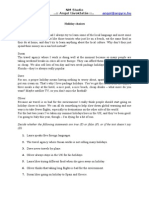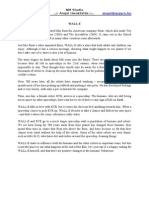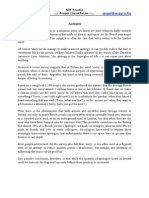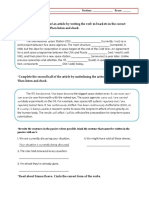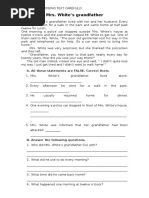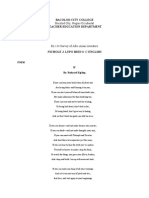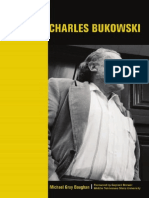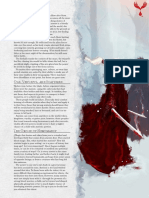Dickens
Dickens
Uploaded by
excalibur2314Copyright:
Available Formats
Dickens
Dickens
Uploaded by
excalibur2314Original Description:
Copyright
Available Formats
Share this document
Did you find this document useful?
Is this content inappropriate?
Copyright:
Available Formats
Dickens
Dickens
Uploaded by
excalibur2314Copyright:
Available Formats
www.argyre.
hu/b2
NM Studio ..:: Angol tvoktats ::..
angol@argyre.hu
Charles Dickens Charles Dickens (1812-70) is widely considered to be one of the greatest writers in the history of the English language. His novels provide a vivid description of life in nineteenth-century England, and tell wonderfully engaging stories that are full of memorable characters. Many of the people in his books have exaggerated characteristics, often being either extremely benevolent or extremely unpleasant, and some of his most famous works are morality tales in which good people end up being rewarded and bad people punished. All his stories make the reader desperate to know what happens next, and during his lifetime most of his novels came out in separate weekly or monthly parts, so people had to wait patiently for the next instalment. Another feature of Dickens work is his social conscience, particularly his awareness of the poverty and bad working conditions suffered by the urban working-class population of nineteenth-century England. At a time when Britain was the worlds richest and most powerful country, he focused on the people who didnt seem to be receiving any of the benefits. This sympathy came from personal experience, as at the age of twelve he had to support his family by working ten hours a day in a filthy London factory, sticking labels on jars of polish. During this period his parents and brothers and sisters were in a special prison for debtors, because his father had spent too much money. Charles used to visit the prison at weekends, and the awful conditions probably provided him with inspiration for his future writing. In his twenties Dickens started a career as a political journalist, and his special talent for storytelling soon became obvious. In his spare time he started to do other kinds of writing, including his first novel, The Pickwick Papers, which became a great success as soon as it was published in 1836-7. Over the next twenty-five years he wrote masterpieces such as David Copperfield, Great Expectations, A Christmas Carol and Oliver Twist. Oliver Twist is the story of a kind-hearted young orphan who gets tricked into joining a gang of pickpockets on the streets of London before eventually being rescued from his life of crime. In the 1960s it was made into a muchloved musical, first for the theatre and then later as a film.
Exercise 1 Here are some simple definitions for words or expressions that appear in the text. Find the words or expressions they refer to and fill in the gaps. 1. _______________ (adjective) kind and helpful 2. _______________ (noun) a child whose parents have died 3. _______________ (noun) a substance that you rub onto an object to make it shine 4. _______________ (adjective) very dirty 5. _______________ (noun) one of several parts of a story or article that are published at different times in a magazine or newspaper
www.argyre.hu/b2
NM Studio ..:: Angol tvoktats ::..
angol@argyre.hu
6. _______________ (noun) someone who steals money and other things from peoples pockets and bags, especially in crowded places 7. _______________ (noun) a long written story about imaginary or partly imaginary characters and events 8. _______________ (noun) an excellent painting, book, piece of music etc, or the best work of art that a particular artist, writer, musician etc has ever produced 9. _______________ (noun) a piece of paper or material fastened to an object that gives information about it 10. _______________ (verb) to provide money, food, or other things that someone needs in order to live 11. _______________ (noun) a group of young people who spend time together and often cause trouble 12. _______________ (noun) someone who owes money 13. _______________ (adjective) very bad 14. _______________ _______________ (noun) a knowledge or understanding of what is morally right in a society 15. _______________ (adjective) having or producing very clear and detailed images in the mind Exercise 2 Decide whether the following statements are true (T) or false (F), or if the text doesnt say (D). 1. Like the character Oliver Twist, Charles Dickens was an orphan. 2. There is music in the 1960s film version of Oliver Twist. 3. Dickens had already earned a lot of money before he started writing novels. 4. Dickens work only became very popular after he died. 5. Dickens didnt write about people who lived in towns or cities. 6. He kept all the money that he earned from working in the factory. Megoldsok: Exercise 1 1. benevolent 2. orphan 3. polish 4. filthy 5. instalment 6. pickpocket 7. novel 8. masterpiece 9. label 10. support 11. gang 12. debtor 13. awful 14. social conscience 15. vivid Exercise 2 1. F 2. T 3. D 4. F 5. F 6. F
You might also like
- Module A - King Richard 3 - Looking For RichardDocument80 pagesModule A - King Richard 3 - Looking For Richardechang28062006No ratings yet
- Phandelver Quest CardsDocument2 pagesPhandelver Quest Cardspacalypse100% (2)
- PrometheusDocument2 pagesPrometheusSawyerRankin100% (4)
- Standards FocusDocument4 pagesStandards Focusapi-255229633No ratings yet
- Angol Igék 3 AlakjaDocument3 pagesAngol Igék 3 AlakjaKinga Mathe50% (2)
- 1001 Books To Read Before You DieDocument58 pages1001 Books To Read Before You Dienhilton6100% (2)
- Shakespeare Pre-Reading ArticlesDocument17 pagesShakespeare Pre-Reading ArticlesdemorachNo ratings yet
- William BlakeDocument3 pagesWilliam BlakeMarco CaldaruloNo ratings yet
- Crime and Punishment in Great ExpectationsDocument6 pagesCrime and Punishment in Great Expectationsvidur_talrejaNo ratings yet
- Charles DickensDocument7 pagesCharles DickensSandraNo ratings yet
- 10 DickensDocument23 pages10 DickensAndrea MiliaNo ratings yet
- IO348S Charles DickensDocument3 pagesIO348S Charles Dickensapi-3786405No ratings yet
- Dickens SlidesDocument23 pagesDickens SlidesEthan BoniniNo ratings yet
- Charles Dickens IntroductionDocument11 pagesCharles Dickens IntroductionJoana BuchlerNo ratings yet
- 14540study Materials On Hard Times CC10 Hons. Sem IVDocument24 pages14540study Materials On Hard Times CC10 Hons. Sem IVSirin HaqueNo ratings yet
- (Rida) Mark Twain ThemesDocument4 pages(Rida) Mark Twain ThemesUme lailaNo ratings yet
- Important QuestionsDocument4 pagesImportant QuestionsSaba MalikNo ratings yet
- Elizabethan Paper3Document13 pagesElizabethan Paper3CreatnestNo ratings yet
- Hard Times NotesDocument7 pagesHard Times NotesannNo ratings yet
- The Lovesong of J Alfred Prufrock ImageryDocument2 pagesThe Lovesong of J Alfred Prufrock ImageryShMendez2013No ratings yet
- Biography DickensDocument3 pagesBiography DickensLejla NizamicNo ratings yet
- PAPER V Poetry FinalDocument535 pagesPAPER V Poetry Finaltanya.jaatniNo ratings yet
- Christina Rosseti IntroductionDocument2 pagesChristina Rosseti IntroductionMansha Chhetri100% (1)
- Sadie & MaudDocument27 pagesSadie & MaudHannan NurNo ratings yet
- Hard Times and The Importance of Dickens in Social ReformDocument76 pagesHard Times and The Importance of Dickens in Social ReformKejti ScarletNo ratings yet
- The Second ComingDocument5 pagesThe Second Comingjaam90001No ratings yet
- A Christmas Carol by Charles Dickens in The Context of Victorian SocietyDocument36 pagesA Christmas Carol by Charles Dickens in The Context of Victorian SocietyTatiana MihaelaNo ratings yet
- Hard Times Introduction PowerpointDocument14 pagesHard Times Introduction PowerpointsarahsmallNo ratings yet
- Research Paper About Negative CapabilityDocument20 pagesResearch Paper About Negative CapabilityLAYLA •No ratings yet
- The Restoration Period (1660-1700) : The Important Facts Which Influenced The Literature of This Period AreDocument6 pagesThe Restoration Period (1660-1700) : The Important Facts Which Influenced The Literature of This Period AreKiều TrinhNo ratings yet
- Hard Times Part 1Document3 pagesHard Times Part 1Winesha U. SmithNo ratings yet
- Blue Bells Model School SESSION 2021-22 Term Ii Class Viii Subject:English Literature/ Novel Lord Ullin'S DaughterDocument8 pagesBlue Bells Model School SESSION 2021-22 Term Ii Class Viii Subject:English Literature/ Novel Lord Ullin'S DaughterRiya AggarwalNo ratings yet
- Thomas Carlyle - A Sign of The TimesDocument11 pagesThomas Carlyle - A Sign of The TimesJack ReadNo ratings yet
- CH 24 Sec 4 - Revolution in The Arts PDFDocument4 pagesCH 24 Sec 4 - Revolution in The Arts PDFJ. NievesNo ratings yet
- Past Papers 2013 Punjab University MA Part 2 EnglishDocument4 pagesPast Papers 2013 Punjab University MA Part 2 EnglishNoor UlainNo ratings yet
- Percy ShelleyDocument16 pagesPercy ShelleymariliaferNo ratings yet
- Analysis of The Grass Is SingingDocument47 pagesAnalysis of The Grass Is SingingAntonella QuinterosNo ratings yet
- Critical TheoryDocument96 pagesCritical TheoryAsmita RaiNo ratings yet
- RT - Silas Marner KeyDocument11 pagesRT - Silas Marner KeyRacso VegetaNo ratings yet
- A Tale of Two Cities: Charles Dickens 1859Document13 pagesA Tale of Two Cities: Charles Dickens 1859nero daunaxilNo ratings yet
- Minor Poets of The Restoration PeriodDocument19 pagesMinor Poets of The Restoration Periodnadieh_baderkhani100% (3)
- Elizabethan PoetryDocument2 pagesElizabethan Poetrymughalhafeez443No ratings yet
- Hard Times: The Unusual NovelDocument9 pagesHard Times: The Unusual NovelКристофор Янчев100% (1)
- William Shakespeare's Life and His AchievementsDocument2 pagesWilliam Shakespeare's Life and His AchievementsSagar ThakerNo ratings yet
- The Swan Book by Alexis WrigDocument9 pagesThe Swan Book by Alexis Wrigkkparashar190773No ratings yet
- Whitman and Background and Song of Myself For Nov 4Document3 pagesWhitman and Background and Song of Myself For Nov 4ChristinaNo ratings yet
- Sonnet 18Document15 pagesSonnet 18albertherrera540No ratings yet
- DeixisDocument7 pagesDeixisNhật quang NguyễnNo ratings yet
- Elizabethan Poetry - Research PaperDocument7 pagesElizabethan Poetry - Research Paperapi-645797970No ratings yet
- Anglo Saxon and Middle English Literature English LitDocument9 pagesAnglo Saxon and Middle English Literature English LitВероника ЯкубоваNo ratings yet
- How Elements of Humor Are Used To Depict Coketown and Its Dwellers (The Gradgrindsand Mr. Bounderby) in Hard Times by Charles Dickens.Document4 pagesHow Elements of Humor Are Used To Depict Coketown and Its Dwellers (The Gradgrindsand Mr. Bounderby) in Hard Times by Charles Dickens.Leila Evaristo100% (1)
- 1 - First Generation of Romantic Poets, PT 1Document4 pages1 - First Generation of Romantic Poets, PT 1Lena100% (1)
- God's GrandeurDocument9 pagesGod's GrandeurNichelle NarineNo ratings yet
- Conrad-Heart of DarknessDocument14 pagesConrad-Heart of DarknessbeaNo ratings yet
- ENG Honours PoetryDocument12 pagesENG Honours PoetryWungreiyon moinao100% (1)
- Poetry QuestionsDocument4 pagesPoetry QuestionssilualNo ratings yet
- What Is Mystery PlayDocument4 pagesWhat Is Mystery Playالمطبخ الراقيNo ratings yet
- Language of DickensDocument17 pagesLanguage of DickenshistoriadigitalNo ratings yet
- Elizabethan AgeDocument3 pagesElizabethan AgechoudharyekkiNo ratings yet
- What Is Literature?: R.J. Rees, R.A. Scott-James, Terry Vargas LlosaDocument21 pagesWhat Is Literature?: R.J. Rees, R.A. Scott-James, Terry Vargas LlosaQhusnul AmaliaNo ratings yet
- Life and Death in Philip Larkin's Poetry:an Analytical Study ofDocument28 pagesLife and Death in Philip Larkin's Poetry:an Analytical Study ofAli Mohamed100% (1)
- The Understanding of Modernism and PostmodernismDocument4 pagesThe Understanding of Modernism and PostmodernismNie Luh AyuNo ratings yet
- 2nd Edition Upper IntermediateDocument2 pages2nd Edition Upper Intermediateexcalibur2314No ratings yet
- DemonstrativesDocument2 pagesDemonstrativesexcalibur2314No ratings yet
- Environment VocabularyDocument1 pageEnvironment Vocabularyexcalibur2314No ratings yet
- Do You Understand B2 SzovegertesDocument89 pagesDo You Understand B2 SzovegertesmleslieNo ratings yet
- The Secret Garden: Activity WorksheetsDocument3 pagesThe Secret Garden: Activity Worksheetsexcalibur2314100% (1)
- China's Tourism Boom Hits The WallDocument2 pagesChina's Tourism Boom Hits The Wallexcalibur2314No ratings yet
- русский язик итцебникDocument1 pageрусский язик итцебникexcalibur2314No ratings yet
- KITEX Idegenforgalom Es Vendeglatas B2 ANGOLDocument36 pagesKITEX Idegenforgalom Es Vendeglatas B2 ANGOLexcalibur2314No ratings yet
- TP CorruptionDocument2 pagesTP Corruptionexcalibur2314No ratings yet
- FrankieburgDocument3 pagesFrankieburgexcalibur2314No ratings yet
- 01 - It's High Time Men Ceased To Regard Women As Second-Class Citizens'Document1 page01 - It's High Time Men Ceased To Regard Women As Second-Class Citizens'Béla VargaNo ratings yet
- Night Walkers UgandaDocument6 pagesNight Walkers Ugandaexcalibur2314No ratings yet
- WWW - Argyre.hu/b2 Angol@argyre - Hu: NM Studio ..:: Angol Távoktatás::.Document1 pageWWW - Argyre.hu/b2 Angol@argyre - Hu: NM Studio ..:: Angol Távoktatás::.excalibur2314No ratings yet
- Word Formation Task2Document2 pagesWord Formation Task2excalibur2314No ratings yet
- Holiday ChoicesDocument2 pagesHoliday Choicesexcalibur2314No ratings yet
- WalleDocument3 pagesWalleexcalibur2314No ratings yet
- Travel JobsDocument3 pagesTravel Jobsexcalibur2314No ratings yet
- Back To SchoolDocument3 pagesBack To Schoolexcalibur2314No ratings yet
- Jim BensonDocument2 pagesJim Bensonexcalibur2314No ratings yet
- Prince, Since It Came Out in July This Year, and Just Like The Readers of The Harry Potter BooksDocument2 pagesPrince, Since It Came Out in July This Year, and Just Like The Readers of The Harry Potter Booksexcalibur2314No ratings yet
- DogsDocument2 pagesDogsexcalibur2314No ratings yet
- WWW - Argyre.hu/b2 Angol@argyre - Hu: NM Studio ..:: Angol Távoktatás::.Document2 pagesWWW - Argyre.hu/b2 Angol@argyre - Hu: NM Studio ..:: Angol Távoktatás::.excalibur2314No ratings yet
- WWW - Argyre.hu/b2 Angol@argyre - Hu: NM Studio ..:: Angol Távoktatás::.Document3 pagesWWW - Argyre.hu/b2 Angol@argyre - Hu: NM Studio ..:: Angol Távoktatás::.excalibur2314No ratings yet
- Read The Text. Are The Sentences True (T) or False (F) ?: WWW - Argyre.hu/b2 Angol@argyre - HuDocument2 pagesRead The Text. Are The Sentences True (T) or False (F) ?: WWW - Argyre.hu/b2 Angol@argyre - Huexcalibur2314No ratings yet
- PDF W ManualDocument1 pagePDF W Manualexcalibur2314No ratings yet
- Ielts Practice Made Perfect: IeltshelpnowDocument10 pagesIelts Practice Made Perfect: IeltshelpnowAnonymous GMUQYq8No ratings yet
- WooorksheetDocument10 pagesWooorksheetapi-395695837No ratings yet
- Genre and Female AgingDocument22 pagesGenre and Female AgingMailaNo ratings yet
- Mrs. White's Grandfather: A. All These Statements Are FALSE. Correct ThemDocument3 pagesMrs. White's Grandfather: A. All These Statements Are FALSE. Correct ThemElena BogoevskaNo ratings yet
- Richard SerraDocument13 pagesRichard SerraJérôme Dechaud100% (1)
- Malar Lived at Keeranur Village in Pudukottai District With Her FamilyDocument2 pagesMalar Lived at Keeranur Village in Pudukottai District With Her FamilyHimanshu GaurNo ratings yet
- Real Brazilian Portugues Lesson1Document10 pagesReal Brazilian Portugues Lesson1juanjo55770% (1)
- Structure (TOEFL)Document9 pagesStructure (TOEFL)Firman Adhi K100% (1)
- File 14 Chapter 7 A Closer Look at Talking Stories-2Document41 pagesFile 14 Chapter 7 A Closer Look at Talking Stories-2Erick OpiyoNo ratings yet
- Expository Essay TKAMDocument2 pagesExpository Essay TKAMIshika KalwaniNo ratings yet
- El 114 AnalysisDocument5 pagesEl 114 AnalysisMamerto LupoNo ratings yet
- Michael Gray Baughan, Michael Gray Baughan, Gay Brewer Charles Bukowski Great Writers 2004Document149 pagesMichael Gray Baughan, Michael Gray Baughan, Gay Brewer Charles Bukowski Great Writers 2004Jared Boyce100% (1)
- Paper 2 PreparationDocument4 pagesPaper 2 PreparationJelutong FooNo ratings yet
- Twain's Style: Mohammed Badr 11Document2 pagesTwain's Style: Mohammed Badr 11Mohammed BadrNo ratings yet
- The Order of SerpentsDocument335 pagesThe Order of Serpentssayali lysNo ratings yet
- When Does Carter and Sadie Host The Gods Again - Google SearchDocument1 pageWhen Does Carter and Sadie Host The Gods Again - Google Searchsambhav songaraNo ratings yet
- Paragraph Development - A Guide For Students' of English As A Second LanguageDocument103 pagesParagraph Development - A Guide For Students' of English As A Second LanguageReader50% (4)
- Neptune/venus Tale of WoeDocument8 pagesNeptune/venus Tale of WoeBob SkinsNo ratings yet
- Bài tập câu tường thuậtDocument2 pagesBài tập câu tường thuậtphanduongpungNo ratings yet
- English Grammar 101Document2 pagesEnglish Grammar 101The Apostle of AlbionNo ratings yet
- AtavistDocument14 pagesAtavistKEREI SERES100% (2)
- Annotated Bibliography & SOPDocument3 pagesAnnotated Bibliography & SOPJuliette RavillierNo ratings yet
- Somebody's MotherDocument15 pagesSomebody's Motherrajesh duaNo ratings yet
- Dll-Week 4 Grade 7 Matatag-Deped Corner DigitalsDocument5 pagesDll-Week 4 Grade 7 Matatag-Deped Corner Digitalsannbonifacio1981No ratings yet
- Department of English Syllabus 2020 2021Document69 pagesDepartment of English Syllabus 2020 2021Savitha RajeshNo ratings yet
- 5 Written Questions ArthurDocument3 pages5 Written Questions ArthurJennifer R. JuatcoNo ratings yet
- An Analysis of Intrinsic Elements On James Joyce Short StoryDocument6 pagesAn Analysis of Intrinsic Elements On James Joyce Short StoryKelvin Laurent100% (1)


